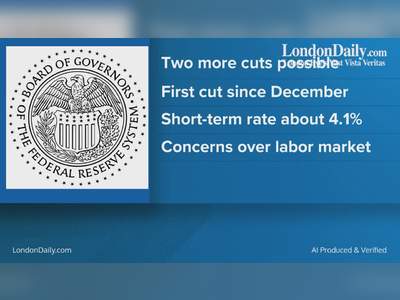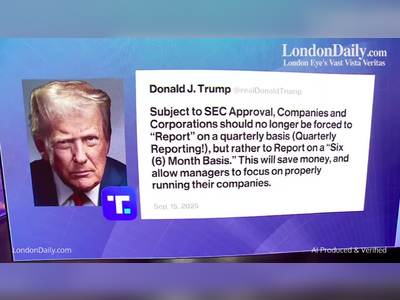US Tech Giants Pledge Billions to UK AI Infrastructure Following Starmer's Call
Microsoft, Nvidia, Google, and others commit massive investments as the UK seeks to become a global AI hub amid plans to scale up compute power and data centre capacity
Several US technology firms have committed multibillion-pound investments to bolster the UK’s artificial intelligence infrastructure, directly responding to Prime Minister Sir Keir Starmer’s call for greater support in that sector.
The pledges, timed to coincide with President Donald Trump’s state visit, aim to strengthen the UK’s ambitions to become a global AI hub and include substantial new capital from Microsoft, Nvidia, Google, OpenAI and others.
Microsoft has announced it will invest over thirty billion US dollars in its UK operations and AI infrastructure over the next four years.
This includes fifteen and a half billion dollars in capital expenditure, alongside plans to install twenty-three thousand advanced AI chips.
Nvidia is partnering with cloud start-ups Nscale and CoreWeave to install 120,000 of its AI chips across the UK, including a five-hundred million-pound investment in Nscale itself.
The company also supports “Stargate UK”, a partnership with OpenAI aimed at strengthening sovereign compute capabilities.
Google intends to invest five billion pounds in a new data centre and continue AI research via DeepMind.
Prime Minister Starmer emphasised that the deal signifies confidence in the UK’s economic trajectory and renews its status as a global technology leader.
The government formally launched its “Tech Prosperity Deal” with the United States, a pact worth some thirty-one billion pounds (around forty-two billion US dollars), which spans AI, quantum computing, and civil nuclear energy.
Despite the overwhelmingly positive response, companies and analysts flagged persistent obstacles: high energy costs, slow planning approvals, and tensions with US authorities over the UK’s two percent digital services tax.
While no concessions were made on the tax, political leaders expressed desire for broader cooperation with tech firms to ensure these deals bear fruit.
Among supporters of the UK’s potential is Nvidia’s Chief Executive, Jensen Huang, who described the UK’s academic strength, burgeoning start-ups, and dense talent pipeline as foundations for its rise.
He remarked that Prime Minister Starmer had “internalised the importance of building infrastructure here in the UK”.
Still, some argue the asymmetry of the agreements risks the UK gaining less leverage, pointing to the investment side weighed in favour of US tech companies.
The government has pledged to tackle infrastructure and regulatory bottlenecks through its AI Growth Zones initiative, intended to streamline planning processes and improve energy supply for data centres.
These reforms are seen as essential to accommodate the scale of investment now promised.
The pledges, timed to coincide with President Donald Trump’s state visit, aim to strengthen the UK’s ambitions to become a global AI hub and include substantial new capital from Microsoft, Nvidia, Google, OpenAI and others.
Microsoft has announced it will invest over thirty billion US dollars in its UK operations and AI infrastructure over the next four years.
This includes fifteen and a half billion dollars in capital expenditure, alongside plans to install twenty-three thousand advanced AI chips.
Nvidia is partnering with cloud start-ups Nscale and CoreWeave to install 120,000 of its AI chips across the UK, including a five-hundred million-pound investment in Nscale itself.
The company also supports “Stargate UK”, a partnership with OpenAI aimed at strengthening sovereign compute capabilities.
Google intends to invest five billion pounds in a new data centre and continue AI research via DeepMind.
Prime Minister Starmer emphasised that the deal signifies confidence in the UK’s economic trajectory and renews its status as a global technology leader.
The government formally launched its “Tech Prosperity Deal” with the United States, a pact worth some thirty-one billion pounds (around forty-two billion US dollars), which spans AI, quantum computing, and civil nuclear energy.
Despite the overwhelmingly positive response, companies and analysts flagged persistent obstacles: high energy costs, slow planning approvals, and tensions with US authorities over the UK’s two percent digital services tax.
While no concessions were made on the tax, political leaders expressed desire for broader cooperation with tech firms to ensure these deals bear fruit.
Among supporters of the UK’s potential is Nvidia’s Chief Executive, Jensen Huang, who described the UK’s academic strength, burgeoning start-ups, and dense talent pipeline as foundations for its rise.
He remarked that Prime Minister Starmer had “internalised the importance of building infrastructure here in the UK”.
Still, some argue the asymmetry of the agreements risks the UK gaining less leverage, pointing to the investment side weighed in favour of US tech companies.
The government has pledged to tackle infrastructure and regulatory bottlenecks through its AI Growth Zones initiative, intended to streamline planning processes and improve energy supply for data centres.
These reforms are seen as essential to accommodate the scale of investment now promised.









